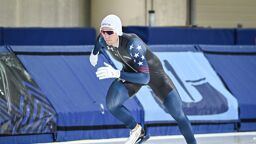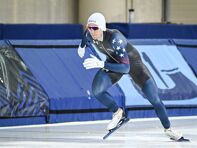For Pride month, we’ve dedicated each day of June to an individual athlete or coach whose shining moment changed LGBTQ sports.
Set against the backdrop of Vladimir Putin’s Russia, the 2014 Sochi Olympics were going to present a unique set of challenges for LGBTQ athletes attempting to compete in the home of one of the most repressive anti-gay regimes on the planet.
Gays were warned, “Don’t call attention to yourself.” A Russian judge banned the Olympics Pride House for fear it would “undermine public morals.” And Russia vowed to enforce its “anti-gay propaganda” law during the Games.
With all of this chaos and hate lurking beneath the surface, there were legitimate questions as to how LGBTQ athletes would perform in Sochi. But as Dutch speed skater and out bisexual Ireen Wüst proved, the answer was: they would dominate.
Having won a gold medal in the 1500 meters at the 2010 Olympics, the speed skating community already knew who Wüst was. But at Sochi, she would take her triumphs to the next level.
Wüst won gold in the women’s 3000 meters event and complemented her triumph with three silver medals in the 1000, 1500, and 5000 meters. Finally, she added yet another gold in women’s team pursuit, with The Netherlands squad being described as “a runaway train.”

All told, Wüst’s five medals were the most of any athlete at Sochi. An intensely private athlete, Wüst declined to engage in any activism or make statements in support of the community during her time in the spotlight.
However, her incredible performance and seemingly permanent residence on the medal platform said all that needed to be said about the strength and resilience of LGBTQ athletes. There was perhaps no greater scene during the entire Sochi Olympics than Wüst being welcomed back to Holland House after her 3000 meter gold:
That’s the sight and sound of pure unadulterated joy. No wonder Putin tried to ban it.
We’ll have another Moment of Pride tomorrow and every day this month.



























